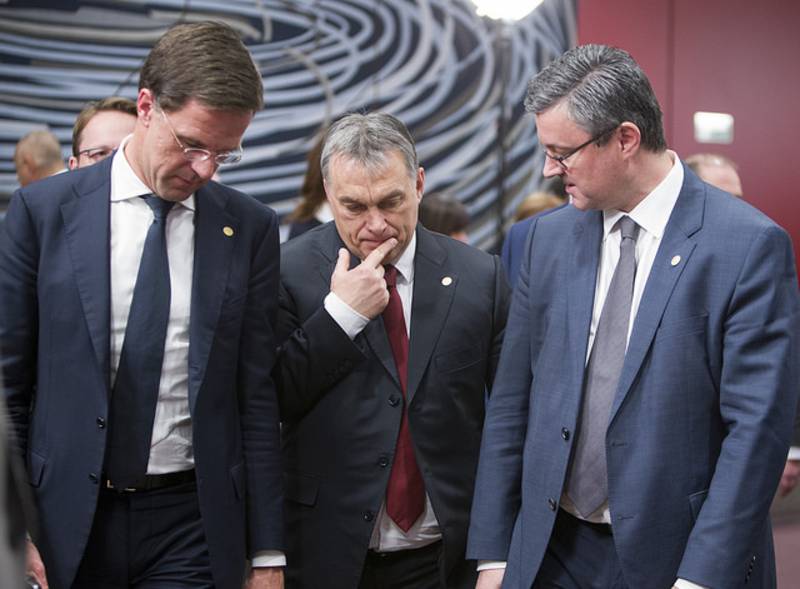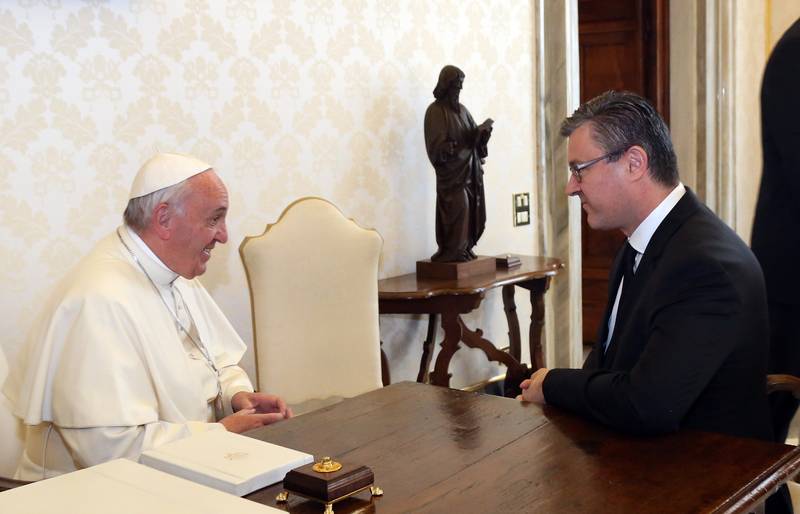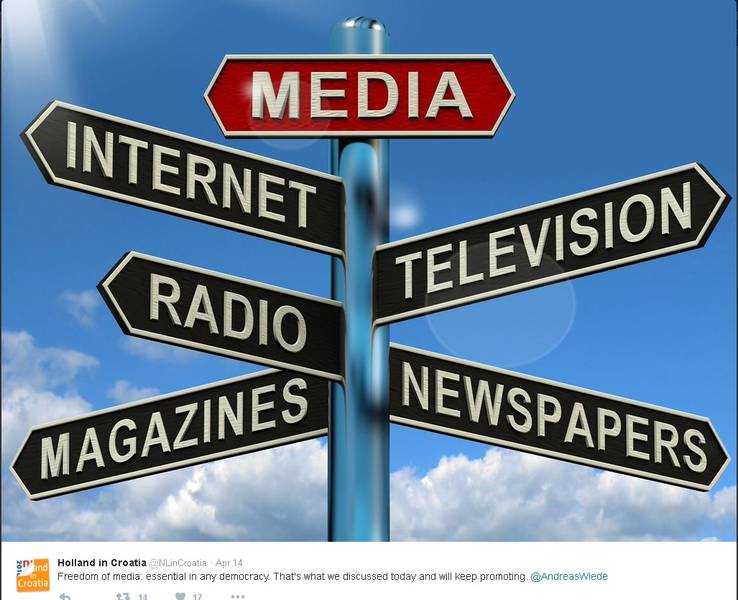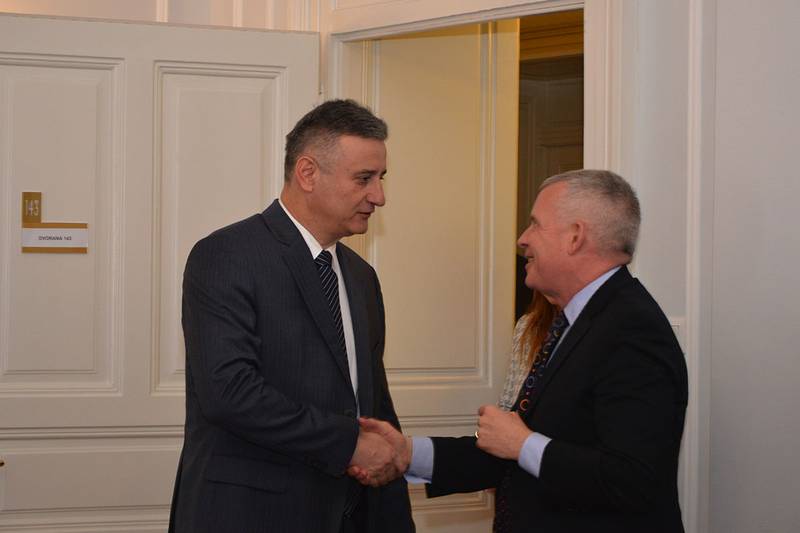Croatian Conservatism Is Fighting a Trench War for Survival
Adelina Marini, April 21, 2016
 Unlike Polish conservatism, the Croatian one is fighting a hard battle for survival both internally and externally. The fact that the Croatian conservative party Croatian Democratic Union (HDZ), which has strong connections with the Catholic Church, suffers from “severe patriotism” (in the words of its leader Tomislav Karamarko), and is a member of the EPP, did not manage to win the coveted total majority at the parliamentary elections in November of last year, turned out to be a serious obstacle to the development of a Hungarian-Polish scenario in the EU’s newest member state. The HDZ is governing in a coalition (which the junior partner refuses to name a coalition) with the next political phenomenon in the sky – Most of independent lists - which also has a right-wing inclination and kinship with the Church, but they have an ideologically clean past, making them unburdened, if too inexperienced. Despite its shortcomings Most turn out to be the only ones who, at this stage, are stopping the orbanisation of Croatia, which would be bad not only for Croatia, but for the entire ex-Yugoslavia region.
Unlike Polish conservatism, the Croatian one is fighting a hard battle for survival both internally and externally. The fact that the Croatian conservative party Croatian Democratic Union (HDZ), which has strong connections with the Catholic Church, suffers from “severe patriotism” (in the words of its leader Tomislav Karamarko), and is a member of the EPP, did not manage to win the coveted total majority at the parliamentary elections in November of last year, turned out to be a serious obstacle to the development of a Hungarian-Polish scenario in the EU’s newest member state. The HDZ is governing in a coalition (which the junior partner refuses to name a coalition) with the next political phenomenon in the sky – Most of independent lists - which also has a right-wing inclination and kinship with the Church, but they have an ideologically clean past, making them unburdened, if too inexperienced. Despite its shortcomings Most turn out to be the only ones who, at this stage, are stopping the orbanisation of Croatia, which would be bad not only for Croatia, but for the entire ex-Yugoslavia region.
Back to the past
Political reality in Croatia goes in the opposite direction of European fashion trends. Instead of losing support, mainstream parties are recovering it and newly arisen parties burn out quickly and remain history. This was demonstrated both in the latest polls and in the internal party elections, which happened this spring in the two largest Croatian political parties, as well as in several smaller, which participate or have participated in governing coalitions. There were elections in the Social Democratic Party (SDP), which until recently governed in a coalition with left-wing and liberal parties. There were elections in the HDZ as well. In both parties, the current leaders got re-elected. The Social Democrats had more of a choice – competing for the leader’s position was former PM Zoran Milanović, who has been leading the party since 2007, and Zlatko Komadina.
Delegates, however, preferred Milanović, despite the fact of the party losing key elections over the last three years – the European Parliament elections and the presidential elections of last year. At around the same point in time he relinquished power as well. Re-electing Milanović means that the left-wing front has nothing new to offer. The rhetoric and behavioural patterns will remain. According to a March poll of Crodemoskop, the Social Democrats continue to be the second most-liked party with 28.2% of public support.
Elections were held in the HDZ as well, being a little bit more democratic for the first time in history in the sense of introducing the system one member=one vote. However, there was no competition. Tomislav Karamarko won a second term with the promise to throw aside ideological quarrels, that were the foundation of the entire pre-election campaign for the parliamentary elections and which poisoned the post-election difficult government formation as well. In other words, the man, who after getting elected for the first time led the party to the suburbs of the right–wing, began building a personality cult for the first president of independent Croatia Franjo Tuđman and positioning the battle with his main opponent along the Ustaša-Communist axis, announced a U-turn for his  second term. At the moment, the party has the highest community support – 30.9%.
second term. At the moment, the party has the highest community support – 30.9%.
The third power by influence continues to be Most of independent lists with Božo Petrov as a leader, which participates in the coalition government. Support for it keeps on falling from 15.4% three months ago down to 8.9% in March. The former third political power ORaH, which had real chances at the presidential elections, but blew them, is already at the political bottom. This is a party with a very clear green profile. At the peak of its popularity, it managed to push forward a single MEP - Davor Škrlec. The party was led by the enigmatic Mirela Holy, known as the lady in black, for she dresses in all black, but after the parliamentary elections she resigned. Ever since, then the party has been in a state of permanent disintegration. It lost its only MEP as well, after Mr Škrlec announced in an open letter recently that he is leaving, due to disagreements with the party’s leadership. At the moment, Croats' support for the party is 1.6%.
Another strong political phenomenon, which almost put a spoke in the political wheel of the big boys at the presidential elections in Croatia is the SYRIZA-esque extreme left-wing and Eurosceptic party Live Wall, led by the young Ivan Vilibor Sinčić. After the presidential elections, the party burned out, but there is a noticeable increase in the support for it. At the moment, it ranks fourth with a 4% support. In February, support for it was 3.1%. Crodemoskop treats this fact as taking votes away from Most. The rest of the new parties and pre-election coalitions of former political figures gravitate around and under the 1% mark.
What is curious is that the great Croatian paradox remains after the internal party elections. Tomislav Karamarko continues to be the least-liked politician in Croatia, but at the same time he was re-elected for the leader’s post of the most-liked party. Up until Zagreb mayor came out with a party that is named after him, Mr Karamarko occupied the last spot. Now he is second to last. He is liked by just 2.5% of Croats. His arch-opponent Zoran Milanović fares way better. He is third with 8% support, but people who like him are less and less. In February, he was liked by 10.3%. The most-liked politician has always been the president. At the moment, this is Kolinda Grabar-Kitarović, who enjoys the support of 20.1%, but her image is already not as clear as it was. She used to be liked by 24.6% (in February).
The big star is PM Tihomir Orešković, who is a non-partisan figure, having a key role in the current political turmoil. Support for him jumped from 2.2% two months ago to 16.5% in March.
Internal party struggles happened in the liberal Croatian People’s Party – Liberal Democrats (HNS) as well, led until recently by the first deputy PM and foreign minister Vesna Pusić. At the moment, she is running for UN Secretary General. At the elections last weekend, she passed the leadership post to her deputy Ivan Vrdoljak, who served as economic minister in the previous government. With Mr Vrdoljak’s election and the resignation of Mirela Holy, the Croatian political scene turned into a man-only business.
Does the wolf change his skin?
The big question in Croatia currently, however, is what direction will the country take, being already subjected to strong internal (within the coalition) and external (Western partners) pressure already. Events from the previous weeks are more than worrying and precipitated sharp reactions by the ambassadors of key Croatian allies. Due to the media repressions, which started immediately after the formation of the new government, the diplomats of several member states, led by Austria, as well as the USA, reacted sharply to what is happening in the country during a special meeting with the president. Immediately after that they shared their reactions on Twitter as well. Austrian ambassador Andreas Wiedenhoff tweeted after the meeting “I have just had a very interesting meeting with colleagues and friends regarding media freedom. This is a key priority for our foreign policy.” His tweet was retweeted by the accounts of the embassies of the USA, Great Britain, and others.
The official account of the Dutch embassy – the one of the country currently holding the rotating presidency of the Council of the EU – in turn published a revealing illustration, accompanied by the following text: “Media freedom: an essence for every democracy. This is what we discussed today and we will continue to fight.” The ambassadors’ reactions did not go unnoticed. The president criticised them for meddling in internal affairs. “I find this very strange, considering ambassadors cannot and should not interfere with the internal affairs of their host countries”, she said. The discussion continued again on Twitter, where the Austrian ambassador expressed his conviction that Ms Grabar-Kitarović shares the ambassadors’ commitment to media freedom worldwide. “This is one of our key  values”, he wrote further. The tweet was retweeted by several ambassadors, including the American top diplomat Julieta Valls Noyes.
values”, he wrote further. The tweet was retweeted by several ambassadors, including the American top diplomat Julieta Valls Noyes.
Media problems in Croatia came after, in the very first days in office for the new government, the bosses of the state-owned radio and television got fired. This was followed by the replacement of anchors of several key news broadcasts in the state television. There were calls for the replacement of the chairwoman of the Council for Electronic Media and, in the end, she resigned, stating as her motive tremendous political pressure. The third step was the taking off air of the satirical show “Staged Process”, where authorities got often derided. Media hardships continued with the regrettable reaction of Minister of Culture Zlatko Hasanbegović, who, instead of harshly condemning the attack against the famous Croatian columnist of the Jutarnji list newspaper Ante Tomić (his books were published in Bulgaria as well), said that journalists should be careful what they publish.
And this week, the grand scandal revolves around a satirical article [in Croatian] by Hrvoje Marjanović for the popular Internet medium Index. It is about the return of the remains of Croatian saint Leopold (Bogdan Ivan Mandić) to Zagreb from Padova, which was broadcasted live by the Croatian television and was a large event in the country. The body of the saint has been embalmed and is fully preserved. Marjanović’s text dates April 13 and is titled “Dead men live: Catholic necrophilia orgies – the most watched show on the HRT”. In his text, he urges for never again having mass wondering at the British “and their circus attraction called Royal wedding, nor laughing at the Americans, who have an orgasm watching fake wrestling matches”. The author further writes that no more remarks should be made on Pride marches as well, for what was televised live was like a scene from a zombie movie.
“This reminds of the state where dead men vote, make politics, and refuse to leave public life, although they have been dead for 15, 50, or more years. A full square of people, who hail with songs and live broadcasts the arrival of the travelling carcass of an one-armed saint, because this is all you should know about us and about how little does the word ‘normal’ mean”, ends his comment Hrvoje Marjanović. The text caused sharp reactions. It was condemned also by the journalists’ union. In the meantime, however, Index has started receiving death threats against the medium and the author, and the official HDZ account on Twitter opened a poll asking whether the article was a satire or not. To my question whether, if it is proved not be, the author will follow the fate of Jan Böhmermann, who will be prosecuted because of his tasteless satire addressed at Turkish President Recep Tayyip Erdoğan, the account replied that when something is offensive, it is offensive, and if need be Marjanović will be sued.
It did not become clear who will be making the decision whether the text is offensive or not and what criteria will be used. To top it all, Minister of Construction Lovro Kuščević (HDZ) began his press conference several days ago with the words “Hail Jesus and good morning” and ended it with "Thank you very much, God bless!”. His words were perceived as a threat to the secular character of the state. He, however, sees nothing bad in that. It is the same like when Obama says “God bless America” or when the British say “God save the Queen”.
The subject of the participation of the Church in political life is wide and especially current at the background of the debates all over Europe on how real is the Islamisation threat and at the backdrop of the fight against religious symbols and at the same time the fight to show that Europe is a Christian continent. In that sense, Croatia is no exception, being a very Catholic state. The reactions to journalists’ texts, however, are the true measure for the strength and stability of democracy, for the step from the reactions to the Marjanović text and what happened in the office of the French satirical magazine Charlie Hebdo a year ago is not that great. It was by no coincidence that a strong message was sent by the presenting of the Pulitzer Prize for cartoon to Jack Ohman of the Sacramento Bee on this very subject. euinside reported extensively on the subject of satire and cartoons.
In Croatia, however, it is not just the treatment of media that is a problem. Many, including diplomats, are concerned by the scandal surrounding the commemoration of the anniversary from the atrocities in the Croatian Fascist Jasenovac concentration camp. The subject climbed up highest on the public agenda immediately after the appointment for Minister of Culture of Zlatko Hasanbegović, who was accused of attempting through his scientific endeavour in the past to relativise and belittle the crimes of the Ustaša state. His words of today that he does not support any criminal regime could not convince the representatives of the Jewish and Serbian communities in the country, who refused to participate in the official ceremony on Friday. The HDZ, under Tomislav Karamarko’s leadership, repeatedly missed condemning clearly the more and more frequent cases of clear support for the Ustaša regime, the Ustaša shouts of “Ready for the Motherland” at football matches and the central streets of Zagreb by football fans as well as by black-shirts. Some of these incidents happened in the presence of high-ranking government representatives, including PM Orešković.
Everyone later attempted to condemn these displays, but there is not a single person arrested for hate speech, and there are already too many of them. This right-wing behaviour is too dangerous at a moment when in neighbouring Serbia there is, too, a mighty campaign going on for rewriting history and relativisation of large crimes in history – both the newest and the oldest. So far, the pressure on Croatia is just at diplomatic level. There was also a special meeting with diplomats in the presidency on Tuesday as well, this time without the participation of Ms Grabar-Kitarović, who is visiting the USA. At the beginning of April, Zagreb was visited by the Department of State’s Special Envoy for Holocaust Issues, Nicholas Dean. He met  separately with both Deputy PMs – Tomislav Karamarko and Božo Petrov - as tradition calls for in this coalition.
separately with both Deputy PMs – Tomislav Karamarko and Božo Petrov - as tradition calls for in this coalition.
The black marks that Zagreb is accumulating with great speed are becoming more and more. What irritates Western diplomats, including the USA, is the unilateral decision of the government to block the opening of Chapter 23 in the negotiations with Serbia. Until now there is no official reaction by the EC, which is currently busy fighting conservatism in Poland, with the exception of the warning that the EC is monitoring the media situation in the country closely.
What is Croatia’s future?
At the moment, the ruling coalition is being shaken by mighty shocks. The HDZ’s ambitions are not satisfied and they are looking for ways to shake off the uncomfortable partner Most. Given the public attitudes, possible new elections could bring a true Polish-Hungarian scenario in Croatia, although this would be far more dangerous than in Hungary and Poland, for in the Croatian case painful Balkan nerve endings will be affected, especially if Serbia’s current PM Aleksandar Vučić wins the snap elections on April 24, which looks possible. This could seriously raise the tension between the two countries, which inevitably means problems to the EU as well. Unless Tomislav Karamarko is truly honest in his intention to end ideological battles. It is difficult to conclude so by his words alone, for he also made an attempt at condemning Ustašianism, but there was one “although” in a “but why do you beat the blacks” style.
Having Zoran Milanović for main opponent, the change in course looks quite unlikely. The Ustaša-Communist identity is still too strong and stands in the way of Croatia in starting down the road of Greece, Spain, Italy, and other countries in the EU, where the mainstream parties have lost their identity and gave way to new political powers. Croatia’s newest history, too, is a mighty source of electoral food. The emergence of Most last year was the white swallow, which showed that there is a class in society, which wants reforms and breaking away from the past. The dropping support for this swallow, however, shows that some voters either return to the well known old, or are going to wait for the appearance of something new, and until then Croats will continue to live off the circuses, offered by the mainstream parties.
Translated by Stanimir Stoev
 Kolinda Grabar-Kitarovic | © KGK
Kolinda Grabar-Kitarovic | © KGK Jozo Rados | © European Parliament
Jozo Rados | © European Parliament Aleksandar Vucic, Andrej Plenkovic | © Vlada RH
Aleksandar Vucic, Andrej Plenkovic | © Vlada RH